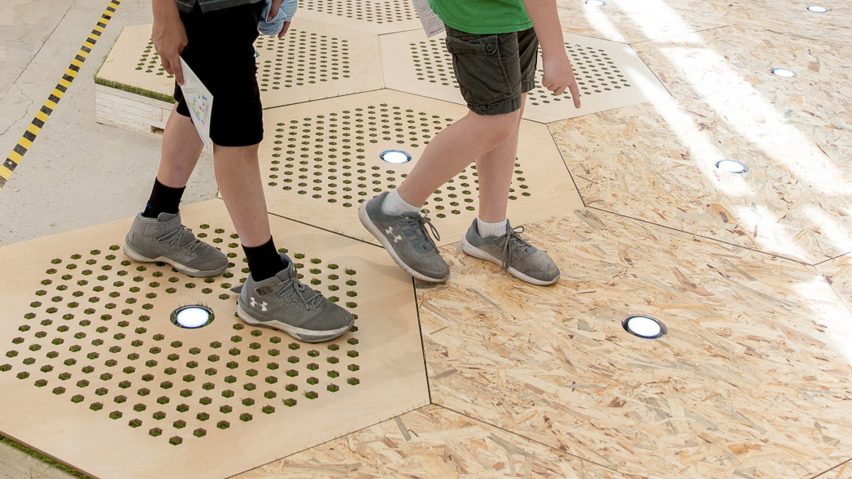Italian architect Carlo Ratti and Alphabet company Sidewalk Labs have worked together on a modular paving system that can change the use of a street throughout the day.
Dynamic Street is a prototype paver developed by Carlo Ratti Associati (CRA) alongside Sidewalk Labs — the urbanism-focused subsidiary of Google parent company Alphabet.
The system of hexagonal pavers is designed to be easily picked up and moved around "within hours or even minutes", according to CRA.
The goal is to enable the same stretch of road or pavement to be used for different purposes at different times of the day or week. CRA gives the example of an urban passageway that is busy with foot and bicycle traffic during rush hour, but quiet for the rest of the day.
Dynamic Street would enable this strip to be transformed into a play space in the middle of the day, or reconfigured for a block party or basketball game on weekends.
"The Dynamic Street creates a space for urban experimentation," said Ratti, who also serves as the director of the Senseable City Lab at the Massachusetts Institute of Technology. "With this project, we aim to create a streetscape that responds to citizens' ever-changing needs."
In addition to being easy to rearrange, the Dynamic Street pavers are embedded with lights that can be set to communicate crossings, bike lanes, pick-up zones or other guidance.
Each paver also has a slot for inserting optional vertical elements, such as bollards, bike racks, exercise equipment, microphone stands or basketball hoops.
CRA project manager Emma Greer believes that it will become even more useful to have flexible streetscapes with the arrival of self-driving cars.
"Self-driving cars will change both the number of lanes and the amount of parking we will need," she said. "The Dynamic Street explores a flexible platform that allows people to see how technology can evolve and respond to different conditions."
The Dynamic Street is inspired by a developments in removable pavers made by French research group IFSTTAR in the city of Nantes.
CRA and Sidewalk Labs' prototype is made from wood, but the creators envision the finished product coming in a range of materials, including concrete and rubber.
The project is on display at Sidewalk Labs' 307 workspace in Toronto, where 232 of the modular pavers are arranged to simulate an 11-metre-wide street. It's open to visitors every weekend throughout the summer.
Sidewalk Labs is in the process of redeveloping an unused stretch of waterfront in the city — Canada's largest — which will incorporate several experimental elements and innovative tech.
In an interview with Dezeen, the company's head of urban systems Rohit Aggarwala said that their goal is to "speed up" the process of urban regeneration by taking advantage of newly available technologies.
Ratti similarly incorporates cutting-edge tech into his projects. Recent examples include Turin's high-tech Office 3.0, a smart road system and a sewage-sampling robot for eliminating diseases.
Photography is by David Pike.

